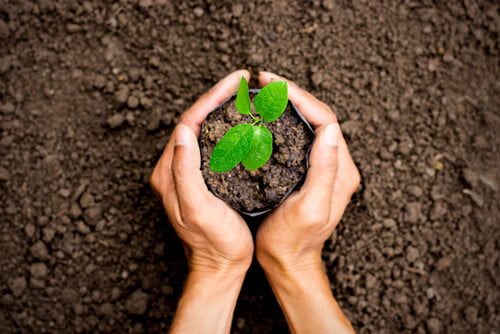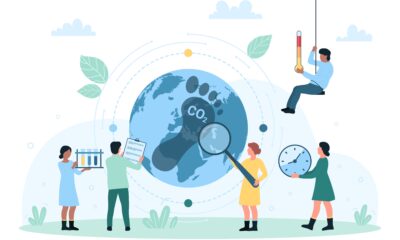

Editors Choice
6 Tips For Reducing Your Environmental Impact On The Planet
It feels like everyone is talking about the environment these days. With humans throwing out about 264 tons of trash a year, and the average person’s carbon footprint totalling 19 tons or more a year, the push toward sustainability is bigger than ever. We will likely never be able to fully live in harmony with nature.
Pretty much all progress leaves its mark on the environment. But with sustainability initiatives for companies, communities, and even your home, we can drastically reduce our own carbon footprint, and make an effort to have a positive effect on the environment. The following is a list of 6 easy and affordable ways to reduce your environmental impact. As a bonus, most of them can save you money!
1. Save Water
There are a lot of things you can do to save water. Time your showers, and remember to turn off the tap when you’re brushing your teeth or shaving. When you’re cooking, or washing veggies or salad, wait for the water to cool, and then use it on the houseplants. The vegetable matter will add extra nutrients, just like compost does!
In fact, the garden is a great way to help the environment. Use buckets and barrels to collect rainwater, which you can then recycle by watering the houseplants and the garden. Speaking of water, remember to use a cold-water rinse when you do your laundry. Hang your clothes out to dry whenever possible. That’s not so much about saving water, but it’ll save a lot of energy on laundry day.
2. Save Paper
Try not to use one-time paper napkins, plates, or cups. Use cleaning clothes instead of paper towels when you’re cleaning around the house. If you’ve got little ones at home, teach them to draw, paint and color on both sides of the page. Take photos of your kids’ artwork, and you can even use the artwork as wrapping paper or to make other paper crafts.
Get the kids involved with the process, and have them choose what they want to do with each piece. Other ways to save paper include donating old magazines to hospital waiting rooms, going paperless in the office and at home, and of course, remembering to recycle regularly.
3. Grow a Garden
Whether you choose a veggie garden or flowers, you’re helping out the environment. Growing produce will save you money and offer healthier alternatives to what’s typically found in a supermarket. It also helps cut down on the emissions and pollution used to transport veggies to your local grocery store.
Another option is to buy from a farmer’s market. They’re less likely to use pesticides and you won’t find any GMOs or hormones either. Voting with your wallet is a great way to support local businesses, and avoid giving money to less sustainable companies.
If you’re more interested in flowers than vegetation, choose local varieties that won’t upset other local plants, or force them out. Be sure to find varieties to attract honeybees, and avoid pesticides, or look into natural remedies. Or, take the time to plant trees or bamboo. They’re a lot less upkeep, and a single tree can reduce the carbon dioxide in the air by up to 48 pounds a year. That’s 1 ton of carbon dioxide by the time it hits 40 years old!
4. Reduce Waste At The Grocery Store
Reducing waste at the grocery store is as easy as remembering to bring your reusable bag. Most stores offer the option to buy, but chances are you have a serviceable bag at home, and the idea is to stop yourself buying more stuff. For even more waste reduction, stay away from prepackaged foods, which usually come single-wrapped or vacuum sealed. They’re also full of unhealthy preservatives, and let’s be honest, the real stuff tastes a lot better.
It’s not exactly a hardship to stay away from frozen dinners, right? If you really want to cut down on your carbon footprint, you can cut meat out of your diet, or at least beef. Methane production from cows is a major source of greenhouse gases, and commercial farming has had a devastating impact on the environment over the years. If you can’t go veg, try to limit your intake, and buy from a local butcher or farmer. Just like at the farmers market, they’re more likely to use environmentally friendly practices, and tend to take better care of the animals too.
5. Make Good Use Of Electronics
We’re living in the electronic age, and for all the complaining about information fatigue and social disconnection, there are some definite positives for the environment. Instead of printing photos or letters, we can use emails and digital cameras. Instead of lugging heavy books, we can buy ebooks, which saves about 7.5 kgs of CO2 per book. You can even get bills and bank statements paperless, by opting in for emails instead.
To get the most energy saving out of your electronics, use a laptop instead of a desktop, since laptops are designed to use less energy. Remember to use rechargeable batteries to save space in landfills, and keep everything you’re not using powered down or unplugged, to save energy.
6. Dress For The Weather
Keeping your heating and cooling costs low is a great way to save you money, and help the planet. Outdated oil and gas boilers are dangerous for your home and for the environment, and even the best window air conditioners take a lot of energy to cool one room. Put yourself on a central heating and air, which takes much less energy. Use curtains and dress in light clothes to cool down in the summer. In the winter, pile on the blankets, and a hot water bottle to stay toasty warm while still managing to save on your heating bill!
As our population continues to climb, the human impact on the environment is more and more obvious. It can feel like an impossible mess to clean up. But the truth is, you can hugely reduce your own impact by making just a few small changes to your life and your home. Whether working, shopping, or at home with the kids, there are always ways to reduce waste, save energy, and make a positive environmental impact.


 Environment12 months ago
Environment12 months agoAre Polymer Banknotes: an Eco-Friendly Trend or a Groundswell?

 Features11 months ago
Features11 months agoEco-Friendly Cryptocurrencies: Sustainable Investment Choices

 Features12 months ago
Features12 months agoEco-Friendly Crypto Traders Must Find the Right Exchange

 Energy11 months ago
Energy11 months agoThe Growing Role of Solar Panels in Ireland’s Energy Future




























